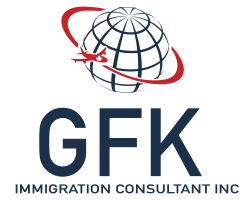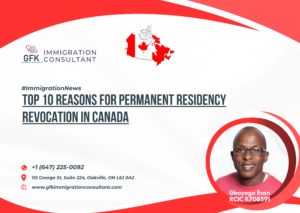Powered by  Translate
Translate
Permanent residency (PR) in Canada is a coveted status, offering immigrants access to various benefits such as healthcare, social services, and the right to live and work anywhere in the country.
However, obtaining PR is just one part of the journey. Maintaining it is equally critical, as permanent residency can be cancelled or revoked under certain conditions.
Losing PR status can have long-term repercussions, including the inability to re-enter Canada or pursue Canadian citizenship.
This article provides an in-depth analysis of the top reasons for PR revocation or cancellation in Canada, ways to avoid common pitfalls, and what affected individuals can do if their status is in jeopardy.
Key Reasons For Permanent Residency Cancellation or Revocation in Canada
1. Failure to Meet Residency Obligations
A major reason for PR revocation is failing to meet Canada’s residency requirements.
What Are the Residency Obligations?
- A permanent resident must stay in Canada for at least 730 days (2 years) out of every 5-year period.
- These days do not need to be consecutive but cumulative over the 5-year span.
- Time spent outside Canada can be counted only if the PR is:
- Accompanying a Canadian citizen spouse or common-law partner. Employed by a Canadian business or the public service abroad.Accompanying a PR family member working abroad under a Canadian organization.
Impact of Non-Compliance
- If immigration officers or the Canada Border Services Agency (CBSA) determine that you did not meet residency requirements, your PR status may be cancelled.
- PR holders may receive a removal order upon entry into Canada if they cannot prove sufficient residency.
2. Misrepresentation or Fraud in Immigration Applications
Misrepresentation is another leading reason for PR revocation. This can involve providing false information or omitting key facts on immigration forms.
Examples of Misrepresentation:
- Submitting fake documents (e.g., employment letters, bank statements).
- Lying about personal information, such as marital status or employment history.
- Using a fraudulent agent or consultant who submits misleading information on your behalf.
Consequences:
Individuals found guilty of misrepresentation could lose their PR status and be banned from applying for Canadian immigration for 5 years.
A Section 44 Report may be issued, followed by a removal order.
3. Marriage of Convenience (MOC)
One of the most scrutinized areas in Canada’s immigration system is family sponsorship, particularly spousal sponsorship.
A marriage of convenience is when a couple enters into a marital relationship solely for the purpose of obtaining permanent residency in Canada.
This type of fraud is illegal, and if discovered, it can lead to the cancellation of the sponsored spouse’s PR status.
Signs of a Marriage of Convenience:
- The couple has little to no genuine relationship history prior to the application.
- Inconsistent or insufficient documentation to prove the relationship (e.g., no photos, minimal communication records).
- No cohabitation after the PR status is granted.
- Financial exchanges solely for immigration purposes.
Consequences
- If immigration officials suspect a marriage of convenience, they may launch an investigation into the authenticity of the relationship.
- A sponsored spouse found guilty of entering a marriage of convenience will have their PR status revoked and may be banned from reapplying for Canadian immigration for a specified period.
4. Criminal Convictions
A PR can be revoked if the person is convicted of certain criminal offences, especially those categorized as serious criminality.
Types of Criminal Offences Leading to PR Cancellation:
- Drug trafficking, assault, or theft.
- Driving under the influence (DUI) — considered serious under Canadian immigration law.
- Fraud or financial crimes (e.g., credit card fraud, tax evasion).
Consequences:
- A PR holder convicted of serious crimes may be issued a removal order.
- If detained by the CBSA, the individual may face deportation without the right to return to Canada.
5. Security Concerns and National Interest Violations
Canada takes national security seriously. If a PR poses a threat to public safety, the government may take steps to revoke their status.
Security Grounds for PR Revocation Include:
- Involvement in terrorism or espionage activities: Espionage is defined as act of finding out secret information about Canada or a Canadian organization
- Membership in organizations involved in subversive activities against Canada.
- War crimes or human rights violations committed in other countries.
Impact:
- A PR identified as a national security threat will be issued a removal order.
- Deportation may follow with no option for appeal or re-application.
6. Misuse of Social Programs or Benefits
Some PR holders misuse the benefits offered by the government, leading to revocation.
Additionally, violating conditions associated with PR can result in status cancellation.
Common Violations Include:
- Misuse of healthcare benefits or accessing services fraudulently.
- Failing to declare overseas assets for tax purposes.
- Engaging in activities that violate employment conditions (e.g., working illegally).
How It Affects PR Status:
- Immigration officials may investigate misuse, which can result in cancellation or fines.
- The Canadian government actively tracks misuse of social programs and penalizes those who violate rules.
7. Human Rights Violations
PR holders found guilty of violating human rights in Canada or abroad can have their status revoked.
Canada has strict policies when it comes to individuals associated with human rights abuses, and these cases are treated with severity.
Examples of human rights violations:
- Participating in war crimes or human trafficking.
- Involvement in genocide or crimes against humanity in any country.
- Acts of torture or other serious breaches of international human rights standards.
Impact on PR Status:
- If found guilty, individuals will be deported immediately and lose their PR status permanently.
- There is typically no right to appeal for those who commit serious human rights violations.
8. Breaching Terms of Sponsorship
If you were granted PR status as a sponsored individual, particularly through spousal or family sponsorship, breaching the terms of that sponsorship can result in PR revocation.
Common Sponsorship Breaches:
- Separation or divorce within a short time after receiving PR (if it appears the relationship was not genuine).
- Failing to notify IRCC of changes in the relationship status, such as moving out or ending the relationship during the sponsorship undertaking period.
- Sponsoring multiple people in bad faith or without following proper legal procedures.
Consequences:
- IRCC may investigate the sponsorship case if it appears the relationship was used primarily to obtain PR status.
- If found to be fraudulent, the sponsored person can lose their PR, and the sponsor may face penalties, including being banned from future sponsorship.
9. Financial Insolvency or Bankruptcy Fraud
In some cases, PR holders engaged in fraudulent financial activities may lose their status. Bankruptcy fraud or tax evasion can result in investigations by immigration authorities.
Examples of Financial Fraud:
- Hiding overseas assets to avoid taxes in Canada.
- Filing false bankruptcy claims while still holding significant assets.
Consequences:
- CBSA may initiate removal proceedings if fraudulent activity is proven.
- Such individuals may also face criminal charges and deportation.
10. Abandonment of Permanent Residency
This a voluntarily abandoning permanent residency and is less common, but valid, reason for PR cancellation. It is renunciation rather than revocation.
Sometimes, individuals who leave Canada for extended periods may decide to forfeit their status.
How Abandonment Occurs:
- A PR holder may choose to live permanently in another country and no longer wish to comply with Canadian residency obligations.
- The individual voluntarily informs Immigration, Refugees, and Citizenship Canada (IRCC) of their intent to abandon PR.
Consequences:
- Once a PR holder officially notifies IRCC of their abandonment, their PR status is permanently canceled.
- They may re-apply for other Canadian immigration programs in the future but will need to meet the eligibility requirements as a new applicant.
Why People Abandon PR Status:
- Employment opportunities abroad.
- A desire to settle in their country of origin or elsewhere.
- The inability to meet residency requirements due to professional or personal reasons.
Can You Appeal a PR Revocation Decision?
Yes, appeals are allowed under certain circumstances. Individuals whose PR status is at risk or revoked may appeal to the Immigration Appeal Division (IAD) or Federal Court.
How to File an Appeal:
- Residency obligation appeals: You must provide evidence showing exceptional circumstances for your absence (e.g., illness or family emergencies).
- Misrepresentation appeals: If the misrepresentation was unintentional, providing documents and testimony may help.
- Criminal conviction appeals: If the conviction was minor or expunged, legal counsel can assist in restoring PR status.
Important Tip: Hiring an experienced immigration lawyer can greatly improve the chances of a successful appeal.
How to Protect Your Permanent Residency Status
- Maintain Residency Compliance: Keep track of your days spent in Canada to meet the 730-day obligation.
- Avoid Misrepresentation: Be truthful in all immigration-related applications and declarations.
- Stay Crime-Free: Follow the laws and avoid situations that could lead to criminal charges.
- Monitor Social Program Usage: Ensure that benefits are used legally and appropriately.
- Follow Immigration Rules and Removal Orders: If issued a removal order, leave the country as required to avoid legal complications.
What Happens After Losing PR Status?
Losing PR status means that the individual can no longer live, work, or study in Canada without applying for a visa.
Depending on the nature of the revocation, there may be restrictions on re-entering Canada.
If deported, the individual may need to wait for a specific period before applying for a temporary resident visa (TRV) or express entry under immigration programs.
In severe cases (such as security issues), re-entry bans are permanent.
Maintaining Canadian permanent residency requires careful adherence to immigration rules, residency obligations, and laws.
Whether it’s meeting the 730-day residency requirement, avoiding criminal activities, or preventing misrepresentation, PR holders must stay vigilant to retain their status.
By understanding the top reasons for PR revocation or cancellation and taking proactive steps, immigrants can protect their status and enjoy the benefits of living in Canada without interruptions.
For those at risk of losing PR, timely legal advice and appeals can make a significant difference.
GFK Immigration
Gboyega Esan RCIC R708591
Phone: +1 (647) 225-0092
#PR #StudyPermit #CanadaImmigration #PostGraduateOpportunities #GFKImmigration #StayInCanada #Express #ExpressEntry #draws #Immigration

